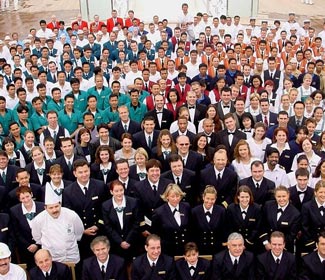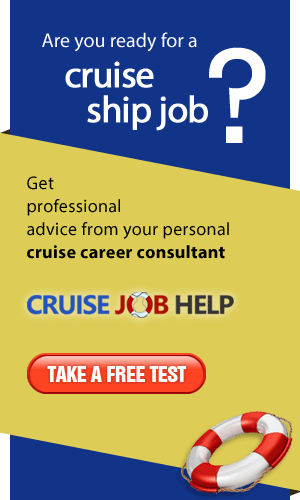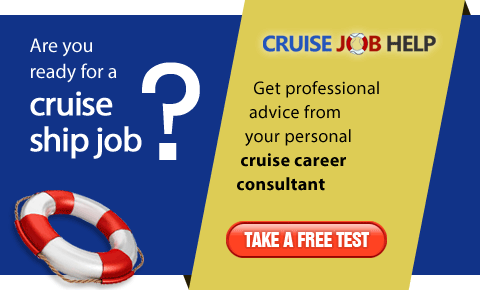Cruise Ship Jobs - Joining Paperwork and Associated Costs
Author: Nikky Ingley, Managing Director at Cruise Academy Ltd
Whether you're thinking of applying for a job on a cruise ship, or you're lucky enough to have bagged yourself a conditional offer, there is a lot of pre-employment paperwork that needs to be taken care of, and it's not always cheap.
Official Documentation Required
Successful candidates are required to obtain a seafarer’s medical before they are able to work on a cruise ship. Employees must be physically fit, and have good vision and hearing.
The medical requirements set by the International Maritime Organisation (IMO) are often more stringent than those required by many land based companies. This is because all seafarers, regardless of the position they are applying for, are expected to partake in regular emergency drills and ongoing safety training while they are on board. Final job offers are dependent on medical clearance and the ability to obtain any necessary visas.
Some positions may also need to apply for a Seaman’s Book (a document similar to a passport that contains details of the seafarer’s movements).
Lastly, you may be asked to obtain a criminal background report/police clearance certificate, and certain positions such as medical personnel and those working with children, will be required to obtain an enhanced disclosure, and may even be expected to provide their fingerprints.

Regulatory Training
There are a few regulatory certificate courses pertaining to ships' safety and security that all seafarers are required to complete, regardless of the job they are applying for. Some companies (those with Flag State approved training centers) may make provisions for new joiners to do this training during their first week on board, while others require their employees to do it prior to joining the vessel. Certain countries require their seafarer's to complete this training in their home country.
The first course is known as STCW Basic Safety Training which consists of 5 courses which are usually delivered together over five days but can be taken separately if needed. Topics including Elementary First Aid, Fire Prevention and Fire Fighting, Proficiency in Security Awareness, Personal Safety and Social Responsibilities, and Personal Survival Techniques make up the minimum basic safety training requirements.
Additionally, seafarers required to assist and guide passengers in the event of an emergency, (in other words, almost everybody working on-board a cruise ship), are also required to hold STCW Crowd Management and Crisis Management and Human Behavior certificates. Together, these certificates could cost in excess of £600 ($800, €670).
Seafarers' Medical Certificates
The medical certificate proves that the seafarer has met the following requirements:
- Has the physical capability to fulfill all the requirements of basic training as specified above.
- Demonstrates adequate hearing and speech to communicate effectively and detect any audible alarms, codes and signals.
- Has no medical condition, disorder or impairment that will prevent the effective and safe conduct of the seafarer’s routine and emergency duties.
- Is not suffering from any medical condition likely to be aggravated by service at sea or to render the seafarer unfit for service or to endanger the health and safety of other personnel on board.
- Is not taking medication that has side effects that will impair judgment, balance or any other requirements for effective and safe performance of routine and emergency duties on board.
Some countries laws, such as those of the Philippines, dictate that the seafarer must undergo this particular medical in their home country. However, the majority of seafarers are able to obtain a medical certificate at an approved facility, as specified by the ship owner.
Required tests may include: a chest x-ray, extensive blood tests (including those for sexually transmitted diseases), drug screening, electrocardiograms and vision and hearing tests. This list is not exhaustive and medical exams can be very costly (circa £180-£600 ($240-$800) depending on cruise line and job role).
While some ship owners cover the cost of their employees' medicals, many do not, and those that do, may only offer reimbursement for select positions.
Visas
Most seafarers will be required to obtain a visa prior to embarking on their adventure, one of the most common being the C1/D visa. Generally, a citizen of a foreign country who wishes to enter the United States must first obtain a visa, either a non immigrant visa for temporary stay, or an immigrant visa for permanent residence.
Crew member (D) visas are non immigrant visas for persons working on board cruise ships. If you travel to the United States to join the vessel you will work on, in addition to a crew member (D) visa, you also need a transit (C1) visa or a combination C-1/D visa.
You will need to obtain an official Letter of Employment (LOE) from the ship owner prior to being able to schedule an appointment at the US Embassy in your home country. These LOEs are usually sent to the candidate once the seafarer has obtained the aforementioned medical certificate.
It's important to note that the cruise operator is legally obliged to bare the cost of the C1/D visa, (currently $160 USD or £120 GBP) or any similar transit visa that may be required, depending on the ship's itinerary. The cost of this is usually reimbursed once the seafarer/crew member has joined their scheduled ship.
Flight Tickets
Your recruitment agent should inform you as to whether you are expected to pay for your outbound travel costs. Naturally these will vary tremendously depending on which part of the world your ship is sailing from.
If you are required to pay for your outbound travel, it's advisable to contact a travel agent specializing in seafarer's tickets. These can often be cheaper, and may offer more flexibility in terms of luggage allowance and last minute itinerary changes.
It's important to note that the cruise operator is obliged to provide your ticket home (repatriation) and may not ask you to make an advancement payment towards the cost of your repatriation at the beginning of your contract, or deduct any money from your salary for the same.
Contracts
Most cruise lines operate on a ‘rolling contract’ system, meaning that your next contract will be renewed automatically upon successful completion of your current one.
Contract lengths vary from 3 to 10 months depending on the position you're holding. Officers and Senior Management generally work from 3 to 6 months consecutively, while other staff and service crew average 6-10 months.
It is a requirement for contracts, otherwise knows as Seafarer’s Agreements, to be sent to the employee prior to their scheduled arrival on board. This enables the seafarer to read and digest the terms and conditions, ask any necessary questions and seek council prior to starting work.
Holidays (otherwise known as shore-leave or vacation) average 6-8 weeks for most positions, and the majority of employees will be paid only while working.



